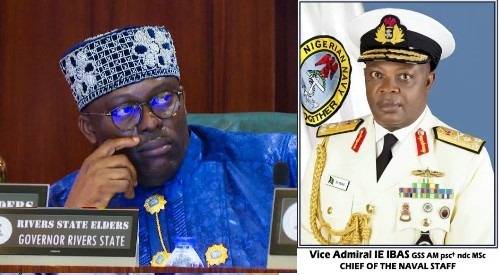Vice Admiral Ibok-Ete Ekwe Ibas Appointed Administrator | In a decisive move to address escalating political and security challenges, President Bola Tinubu has declared a state of emergency in Rivers State. This announcement, made during a national address, led to the immediate suspension of Governor Siminalayi Fubara, his deputy Ngozi Odu, and all members of the state legislature for an initial six-month period.
President Tinubu expressed deep concerns about the deteriorating security situation in Rivers State, particularly the inaction of local officials in curbing militant activities and vandalism. He emphasized that the federal government could no longer afford to remain passive in the face of these threats, which have significantly impacted Nigeria’s vital oil-producing infrastructure.
Appointment of Vice Admiral Ibok-Ete Ekwe Ibas as Administrator
To restore order and ensure effective governance during this period, President Tinubu appointed retired Vice Admiral Ibok-Ete Ekwe Ibas as the interim administrator of Rivers State. Vice Admiral Ibas is expected to oversee the state’s affairs, working closely with security agencies to stabilize the region.
Born on September 27, 1960, in Nko, Cross River State, Vice Admiral Ibas has had a distinguished career in the Nigerian Navy. He enlisted in the Nigerian Defence Academy in 1979 and was commissioned as a Sub-Lieutenant in 1983. He held various key positions, culminating in his appointment as the 22nd Chief of Naval Staff from July 2015 to January 2021. His leadership experience is anticipated to play a crucial role in restoring stability to the volatile region.
Recent Developments Leading to the Declaration
Vice Admiral Ibok-Ete Ekwe Ibas Appointed Administrator | The situation in Rivers State has been marked by rising political tensions and security concerns. Internal conflicts within the opposition People’s Democratic Party (PDP) have led to threats of impeachment against Governor Fubara and his deputy. Additionally, a recent surge in militant activities, including the vandalism of the Trans Niger Pipeline, has further exacerbated instability.
In a bid to address these concerns, President Tinubu engaged with political leaders from the South-South region, emphasizing the necessity of upholding the rule of law. However, with no significant improvements, the federal government deemed it necessary to intervene decisively through the declaration of a state of emergency.
Constitutional and Governance Implications
Vice Admiral Ibok-Ete Ekwe Ibas Appointed Administrator | The state of emergency grants the federal government authority over Rivers State’s administration and allows for the deployment of security forces to restore order. However, the judiciary remains unaffected, ensuring the continuation of legal proceedings and upholding fundamental rights.
As mandated by the constitution, President Tinubu has submitted his proclamation to the National Assembly for approval. The intervention aims to address the immediate security concerns while ensuring that governance structures are realigned to prevent further deterioration.
Public and Political Reactions
The declaration has elicited mixed reactions across Nigeria’s political and civil society landscape. Supporters of the move argue that drastic measures were necessary to prevent further chaos and protect the country’s economic interests tied to Rivers State’s oil production.
Conversely, critics have expressed concerns over the precedent set by such interventions, warning that the suspension of elected officials could undermine Nigeria’s democratic framework. Some opposition figures have accused the federal government of overreach, urging a more consultative approach to resolving the crisis.
Analysis of Governor Fubara’s Tenure and Governance Challenges
Vice Admiral Ibok-Ete Ekwe Ibas Appointed Administrator | Governor Fubara’s tenure has been characterized by controversial decisions and governance challenges, contributing to the current instability. Key issues include:
Presentation of the 2024 Appropriation Bill: Governor Fubara controversially presented the 2024 budget to only a minority faction of the State House of Assembly, a move that the Supreme Court deemed unconstitutional and labeled as “executive recklessness.”
Local Government Elections: The October 5, 2024, local government elections in Rivers State were marred by violence and irregularities, leading to their nullification by the Supreme Court due to non-compliance with electoral laws.
Legislative Obstruction: Political conflicts within the PDP led to the governor being denied access to the State House of Assembly, further highlighting governance failures.
Failure to Address Security Threats: The state government faced criticism for inaction as militants continued attacks on vital oil infrastructure, contributing to the federal government’s decision to intervene.
Vice Admiral Ibok-Ete Ekwe Ibas: The Road Ahead for Rivers State
Vice Admiral Ibok-Ete Ekwe Ibas Appointed Administrator | With Vice Admiral Ibas at the helm, Rivers State enters a crucial phase aimed at restoring governance and security. His mandate includes:
Strengthening security operations to combat militancy and protect critical infrastructure.
Reorganizing administrative structures to ensure efficient governance.
Coordinating with the judiciary to maintain legal and constitutional order during the emergency period.
As the federal government works towards stabilizing Rivers State, the long-term objective remains the restoration of democratic governance under a secure and peaceful environment. The coming months will be crucial in determining the success of this intervention and its implications for future governance policies in Nigeria.
Table of Contents
Discover more from OGM News NG
Subscribe to get the latest posts sent to your email.














